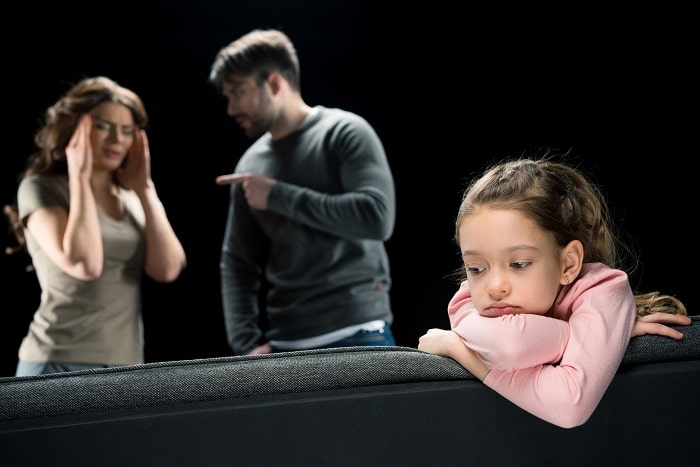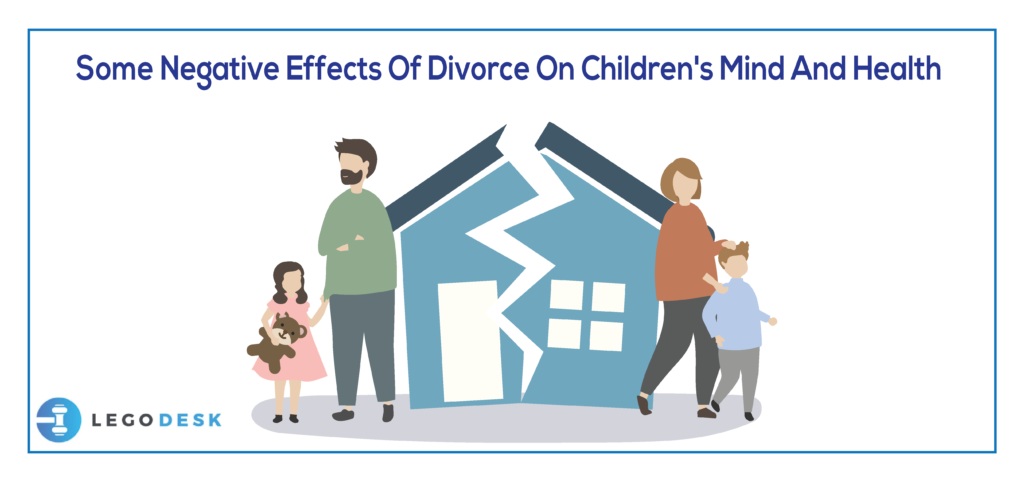Divorce is one of the most difficult challenges a family can face, and its effects on children’s mental health are profound. This article highlights the Impacts of Divorce on Child Mental Health, with a particular focus on how divorce leads children to emotional struggles, the long-term effects, and both the negative and positive outcomes. We will explore key statistics and provide insights to help parents navigate this difficult journey.
Impacts of Divorce on Child Mental Health:
Divorce can be a tumultuous time for families, and it’s essential to acknowledge the significant impact it can have on children’s mental health. Understanding the potential challenges and providing support can help children navigate this difficult transition.

1. Divorce Leads Children to the Worst Places Emotionally:
Children often experience emotional turmoil when their parents divorce. The fear of abandonment and a sense of insecurity can take a toll on their mental health. Divorce leads children to the worst places emotionally, with feelings of loss, confusion, and even self-blame. As a result, they may exhibit childhood tantrums as a way to express their distress and frustration. Children may struggle to understand why their family has broken apart, which can lead to depression, anxiety, and behavioral issues.
2. Do Children Have Mental Health Issues Due to Divorce?
Yes, divorce can trigger significant mental health challenges for children. According to recent research, children are more likely to experience issues such as anxiety, depression, and low self-esteem due to the stress of parental separation. Mental health issues due to divorce can also manifest in sleep disturbances, academic decline, and social withdrawal.
3. Negative Effects of Divorce on Children:
Divorce can have a significant Impacts of Divorce on Child Mental Health and well-being. While the effects can vary depending on individual circumstances, some common negative outcomes include:

- Emotional Turmoil: Children may experience a range of emotions, including sadness, anger, fear, and confusion.
- Behavioral Changes: Divorce can lead to changes in behavior, such as withdrawal, aggression, or academic difficulties.
- Relationship Struggles: Children may struggle to maintain relationships with both parents or feel torn between loyalty to each parent.
- Self-Blame: Children may blame themselves for the divorce, leading to feelings of guilt or shame.
4. Long-Term Effects of Divorce on Children:
The long-term effects of divorce on children can vary depending on individual circumstances, but some potential consequences include:
- Increased Risk of Mental Health Issues: Children who experience divorce are at a higher risk of developing mental health problems, such as depression, anxiety, and substance abuse.
- Academic Difficulties: Divorce can negatively impact children’s academic performance and social adjustment.
- Relationship Challenges: Children may have difficulty forming healthy relationships in adulthood.
- Trust Issues: Divorce can erode a child’s trust in others, particularly in romantic relationships.
- Self-Esteem Issues: Children may experience self-esteem problems, particularly if they feel blamed for the divorce or if they struggle to cope with the changes in their lives.
- Difficulty Handling Stress: Divorce can teach children how to cope with stress, but it can also make them more susceptible to future stress-related problems.
5. The Impacts of Divorce on Child Mental Health: Research and Statistics
Studies and research papers reveal a strong link between divorce and children’s mental health issues. According to statistics, nearly 50% of children from divorced families experience some form of mental health disorder. These statistics on the impacts of divorce on child mental health emphasize the importance of early intervention and support.
6. Positive Effects of Divorce on Children:
While divorce can be a challenging experience for children, it’s important to note that there can also be some positive outcomes. Here are a few potential benefits:

- Improved Relationships: Divorce can sometimes lead to improved relationships between parents and children. When parents are no longer in a toxic or abusive relationship, children may experience relief and improved communication with both parents.
- Increased Independence: Children who experience divorce may develop stronger independence and problem-solving skills. They may also learn to rely on themselves more.
- Enhanced Resilience: Coping with divorce can help children build resilience and the ability to overcome challenges.
- Greater Understanding of Relationships: Children who witness their parents’ divorce may gain a better understanding of healthy and unhealthy relationships.
- Personal Growth: Divorce can be a catalyst for personal growth and development in children. They may learn valuable lessons about life, relationships, and themselves.
7. Who Gets the House in a Divorce with Children: Its Impact on Mental Health
A common concern during divorce is who gets the house in a divorce with children. Stability is crucial for a child’s mental health, and losing a familiar home can be distressing. If a child is forced to move between homes frequently, it may contribute to feelings of instability and anxiety. The impacts of divorce on child mental health can be significant, so ensuring minimal disruption to their living situation is key to supporting their well-being during the divorce process. Join Parenting support groups for further details.
Conclusion:
The impact of Divorce on Child Mental Health has significant implications for children, often leading to emotional and psychological struggles. Divorce leads children to the worst places, causing mental health issues due to divorce, including anxiety and depression. The effects of divorce on children can be both immediate and long-term, impacting their emotional stability and future relationships. Studies show that the negative effects of divorce on children are more prominent when the separation is highly conflictual, but there can also be positive effects of divorce on children, such as relief from household tension.
FAQS:
How does divorce affect a child mentally?
Divorce can lead to emotional distress, anxiety, depression, and feelings of abandonment in children. They may struggle with self-esteem, develop behavioral issues, and face challenges in forming relationships.
What are 5 effects of divorce on children?
Five common effects are:
- Emotional instability
- Academic decline
- Behavioral issues
- Difficulty forming relationships
- Increased anxiety or depression
How do kids react to divorce?
Children may react with anger, sadness, confusion, or guilt. Their reactions depend on their age and the level of parental conflict they experience.
What age is divorce most damaging to a child?
Children between ages 6 and 12 are often most affected as they are old enough to understand but too young to cope with complex emotions independently.
Who suffers most financially in divorce?
Women often suffer more financially in divorce, especially if they were stay-at-home mothers or earned less during the marriage. learn about single mom’s grants.
Who hurts most from the divorce?
Emotionally, children tend to suffer the most from a divorce, particularly if there is ongoing conflict between the parents.
Who is most affected by divorce?
Children are generally the most affected, but both spouses can experience significant emotional and financial impacts.
Who has the worst divorce rate?
The United States has one of the highest divorce rates globally, though it has decreased recently.
What are the 5 stages of divorce?
The five stages are:
- Denial
- Anger
- Bargaining
- Depression
- Acceptance
How does divorce cause stress?
Divorce causes stress by disrupting family life, creating financial worries, and leading to emotional instability for both parents and children.
What are the Impacts of Divorce on Child Mental Health?
The impact includes emotional pain, financial instability, and disruption of daily routines for all family members, particularly children.
Who regrets divorce more?
Studies suggest that men may regret divorce more, often feeling the loss of family structure and emotional support.
Is divorce painful for men?
Yes, men can find divorce very painful emotionally, particularly if they lose daily contact with their children or struggle with loneliness post-divorce.
External Resources:
American Psychological Association: Effects of Divorce on Children’s Mental Health
Child Mind Institute: How Divorce Affects Children’s Mental Health

Empowering parents to raise happy, confident kids. Get practical parenting tips and advice on our blog, Smart Parent Guides.
